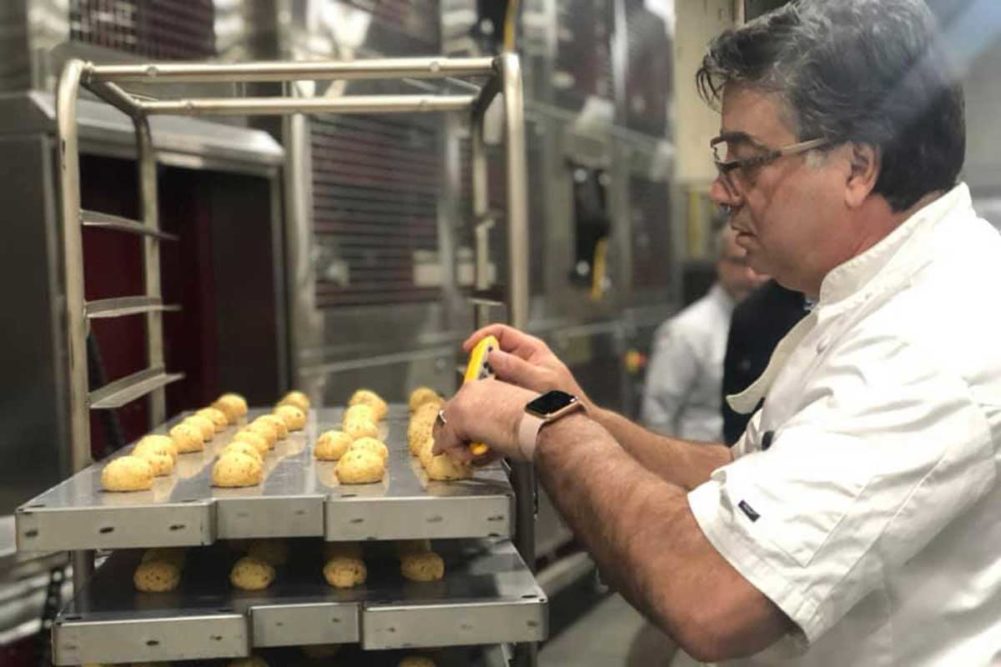PLANO, TEXAS — In the world of food consumption, consumers are demanding more customization than perhaps at any other point in history. Gluten became demonized over the years, and increased interest in plant-based protein and alternative meats is giving rise to opportunities for product innovation.
Protein blends and filled products create new opportunities for bakers and snack manufacturers to create new and innovative products to meet a variety of consumer needs. To facilitate ideation with traditional proteins and meat alternatives in baked foods, Middleby Bakery hosted a two-day seminar at its Bakery Innovation Center in Plano, Texas.
“Our role is to help the industry deliver new products,” said Jay Fernandez, technical director at the BIC.
In a bakery operation, coextrusion technology helps bakers create products such as calzones, steamed buns, hot pockets and other filled items that aren’t necessarily new but may be used as carriers for lean meats and popular meat-alternative proteins.
The technology works well with straight, sponge and no-time doughs, and it is also an option for gluten-free dough with a sticky consistency that’s difficult to run through a traditional divider.
Rheology plays an important role in coextrusion, and during the seminar’s first day, John Giacoio, vice-president of sales, Rheon USA, demonstrated how the company’s equipment can help.
“I like to tell people, ‘This is not rocket science,’” Mr. Giacoio told seminar attendees. “Your job is to come up with something that tastes good, and we’ll get it to work on the machine.”
For example, inclusions such as mushrooms create challenges if they give off a lot of water, so bakers may need to tweak their formulas by using precooked or dried mushrooms.
Temperature also plays a big role with coextruded products.
“Maintaining the right dough temperature will ensure the consistency of the dough,” Mr. Fernandez said.
He suggested when dough is at around 50 to 60° F, it runs nicely through a sheeting line or coextruder.
“When running a yeast-based product, we don’t like the yeast to activate,” Mr. Giacoio added. “Keeping the temperature low will help that.”
When creating a filled product, the precision of coextrusion eliminates waste, Mr. Giacoio said. Oftentimes, the extruder will need to be primed, and the dough that runs through first can be fed right back into the hopper. Rheon equipment is known for its smaller size, and because of this, temperature is not a big concern when refeeding the dough.
“The path is short; the machines are designed so there are not twists and turns so that we don’t build up heat and stressing the product,” Mr. Giacoio said.
While many coextruders have been originally intended for processing meat that is often below freezing, Rheon’s equipment was built first for the confectionery industry and then for baked foods, so gentle handling and temperature control were engineered into the design.
The filled sausage biscuit demonstration culminated with the products being run through an Auto-Bake Universal Line serpentine oven system.
“This system was not only designed to take traditional small- and large-format products, but it’s also ideal for coextruded products as well,” said Scott McCally, president, Auto-Bake.
“We called it the Universal Line because it really can do anything,” he said of the direct-fire convection oven.
In addition to the hands-on workshop, seminar attendees also learned about the latest trends in meat alternatives from industry experts, including Joel Crews, editor, Meat & Poultry, and Hank Schouten, owner, Schouten Plant-Based Foods, and gained insight into product development from Richard Charpentier, owner of Bakery Innovation.
The next seminar, March 25-26 at the BIC, will cover innovation in bread for sandwiches. Visit www.middlebybic.com for more information.

